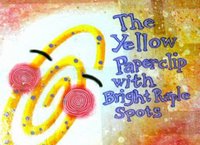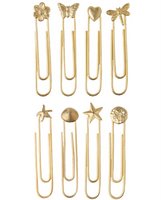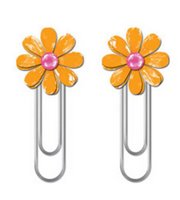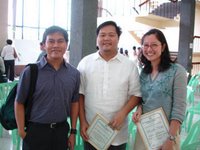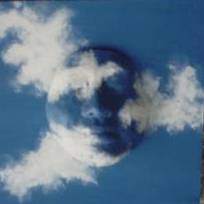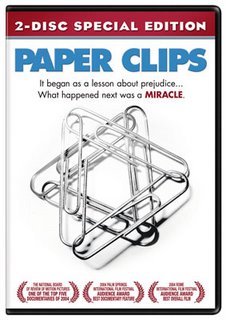 I thought Kyle's One Red Paper Clip project was entertaining, but this Paper Clip Project is an amazing miracle and moved me beyond tears. Adrian, the boyfriend of my Fjupy Friend Trixy, told me about this documentary last year. My dad beat him to his promise of sending me a copy; Papa found the DVD shop at LAX last week and brought home a copy for me as a surprise. I watched it today and I am completely overwhelmed and inspired.
I thought Kyle's One Red Paper Clip project was entertaining, but this Paper Clip Project is an amazing miracle and moved me beyond tears. Adrian, the boyfriend of my Fjupy Friend Trixy, told me about this documentary last year. My dad beat him to his promise of sending me a copy; Papa found the DVD shop at LAX last week and brought home a copy for me as a surprise. I watched it today and I am completely overwhelmed and inspired.Here's a press release to summarize the film from the official website:
Something amazing happened in the town of Whitwell, TN; a town where the population peaks at about 2,000 people and where the word "skyline" is epitomized in breathtaking views of the rustic Smoky Mountains.
The citizens of this rural Tennessee community are almost exclusively white and Christian; the town was not accustomed to cultural diversity. But in 1998 that all changed with a classroom project at Whitwell Middle School. The "Paper Clips" project sparked one of the most inspirational and profound lessons in tolerance, in one of the most least likely places.
Linda Hooper, the school's principal, created the project out of her desire to help students open their eyes to the diversity of the world beyond their insulated valley. What ultimately happened changed the lives of the students, their teachers, their families and the entire town forever, and by the end, they had a new goal: to open the eyes and hearts of people around the world.
"Paper Clips" is a moving story about these students and their emotional journey as they begin to learn about the horrors and tragedies of the Holocaust. Despite the fact that they had previously been unfamiliar with the Holocaust, their dedication was absolute. With a promise to honor and memorialize every lost soul, the students decided to collect one paper clip for each individual exterminated by the Nazis. By the end of the project, the students not only collected 11 million paper clips, but were able to house them in a donated WWII railcar, so they would always have a permanent tribute to the millions who were lost and a permanent memory of the time their small school in Tennessee changed the world one classroom at a time.
After more than two hours (I watched all the additional interviews and extended scenes in Disc 2) and several tear-stained tissues, I realize that I just might have more in common with the students and faculty at Whitwell Middle School than my fellow Filipinos who live next door. My experience as a Third Culture Kid (TCK) and my adventures with The Yellow Paperclip with Bright Purple Spots seem to mirror Whitwell's Paper Clip Project.
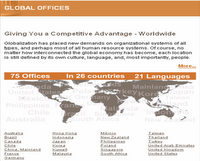 After living in four countries, studying in six schools, and working for a global firm, I'm proud to say that I have always been an advocate of tolerance, intercultural friendships, and making the world an even smaller place by building global connections and going out of your way to understand and appreciate other cultures. I've experienced the whole world come together under a bright red-and-white striped marquee (during our annual United Nations Day celebration), around a noisy cafeteria table (a phenomenon that takes place every single day at an international school), and in various telephone conferences (exchanging best practices in marketing with DDI colleagues from all over the world)... and I love it!
After living in four countries, studying in six schools, and working for a global firm, I'm proud to say that I have always been an advocate of tolerance, intercultural friendships, and making the world an even smaller place by building global connections and going out of your way to understand and appreciate other cultures. I've experienced the whole world come together under a bright red-and-white striped marquee (during our annual United Nations Day celebration), around a noisy cafeteria table (a phenomenon that takes place every single day at an international school), and in various telephone conferences (exchanging best practices in marketing with DDI colleagues from all over the world)... and I love it!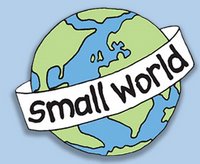 The documentary's intro page says that the feelings that connect us... are greater than those that divide us and I can't agree more. We may look different and have our own passports, languages and gods, but trust me: there really is an analogous human condition - something that brings us all together and makes us one and the same. More than just feelings, there is something fundamentally the same in all human beings that connect us and make us one: is it our capacity to improve ourselves? to enjoy life? to self-actualize? to believe in a Higher Being? to love? It could also be in enjoying the same cup of coffee, or sharing traditions like family dinners and gift-giving. I can't seem to articulate it beyond the "analogous human condition" (I forget which philosopher said that but it's a line from Dr. Garcia's PH101/102 class which has stuck with me since sophomore year) and my personal experience as a Third Culture Kid hanging out with people from all over the world. Perhaps Bono sums it best with the line: We're one but we're not the same.
The documentary's intro page says that the feelings that connect us... are greater than those that divide us and I can't agree more. We may look different and have our own passports, languages and gods, but trust me: there really is an analogous human condition - something that brings us all together and makes us one and the same. More than just feelings, there is something fundamentally the same in all human beings that connect us and make us one: is it our capacity to improve ourselves? to enjoy life? to self-actualize? to believe in a Higher Being? to love? It could also be in enjoying the same cup of coffee, or sharing traditions like family dinners and gift-giving. I can't seem to articulate it beyond the "analogous human condition" (I forget which philosopher said that but it's a line from Dr. Garcia's PH101/102 class which has stuck with me since sophomore year) and my personal experience as a Third Culture Kid hanging out with people from all over the world. Perhaps Bono sums it best with the line: We're one but we're not the same.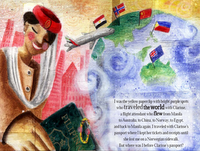 The Yellow Paperclip with Bright Purple Spots is also a story about tolerance and acceptance of our unique selves, as it is a story about travel, global connections, and finding a home wherever you are. When Ani commented that it wasn't a very Pinoy story, I took it as a compliment; far from being an alamat or local folklore, my story is meant for all the TCKs and global citizens, for all who recognize yet respect differences among human beings, and for everyone who wants to make the world a smaller, and thus a better, place. I'm not sure how many people fall into these categories but the students and teachers at Whitwell definitely do.
The Yellow Paperclip with Bright Purple Spots is also a story about tolerance and acceptance of our unique selves, as it is a story about travel, global connections, and finding a home wherever you are. When Ani commented that it wasn't a very Pinoy story, I took it as a compliment; far from being an alamat or local folklore, my story is meant for all the TCKs and global citizens, for all who recognize yet respect differences among human beings, and for everyone who wants to make the world a smaller, and thus a better, place. I'm not sure how many people fall into these categories but the students and teachers at Whitwell definitely do.The Paper Clip Project started in 1998, was celebrated with the dedication of the Holocaust Memorial in 2001, and continues today with the maintenance of the memorial, student scholarships and the construction of a new building. While I know I can't contribute much to their goals of raising hundreds of thousands of dollars, I wholeheartedly support this Paper Clip Project in my own small way. I will:
- tell everyone about the miracle that took place in Whitwell and encourage them to watch the film
- promote understanding, respect and tolerance across cultures in small everyday things (especially here in Manila, like pointing out and making people more sensitive about their racial biases, the use of politically incorrect terms, and overly nationalistic ideas)
- continue building and strengthening intercultural connections and friendships
I said it when Kyle got his house, but I'll say it again with much more conviction now: never underestimate the power of a paperclip. It can change the world and make it a better and smaller place... actually, it already has!

